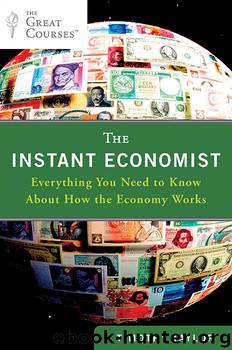The Instant Economist by Timothy Taylor

Author:Timothy Taylor
Language: eng
Format: azw3, mobi, epub
Tags: Itzy, Kickass.to
ISBN: 9781101559772
Publisher: Plume
Published: 2012-01-31T05:00:00+00:00
CHAPTER 21
Unemployment
What is unemployment? That question may seem too obvious to need an answer. But should a homemaker not looking for work be counted as unemployed? What about a worker who has an unrealistic idea of how much pay he or she is going to receive and is waiting for a job offer that is never going to come? A specific definition of unemployment can clarify these sorts of issues.
The official government unemployment rate, calculated by the U.S. Bureau of Labor Statistics, is based on a monthly survey that records how many people do not have work and are presently looking for work. A person who does not meet both of those conditions is counted as “out of the labor force.” About one-third of all U.S. adults are considered to be out of the labor force.
Defining unemployment in this way offers a consistent definition over time, but the underlying meaning can be controversial. For example, what about a discouraged worker—a person who has been looking for a long time but can’t find work and has finally given up? If that person answered the survey by saying, “I’m not looking,” that person is not counted as unemployed. What about someone who’s working part time and answered, “I am working,” even if that person would much rather have full-time work? That person is not counted as unemployed. What about the people who, as occurs in any survey, don’t answer truthfully, who claim they’re looking for work when they’re really not? They are counted as unemployed, even though they may be out of the labor force altogether.
Economists view unemployment in a slightly different way than do government statisticians. In a standard example of a market for, say, bananas, a fall in demand would result in a lower price for that product. When the economy falls into recession, and demand for labor declines, wages and salaries rarely fall in any substantial way. Instead, the quantity of labor demanded falls, and unemployment results. Thus, to economists, unemployment occurs when someone is willing to work at the going wage for that person’s skills and experience level, but can’t find a job. From this perspective, unemployment is a situation in which wages are, for some reason, stuck above the equilibrium level, so that the quantity of labor supplied at that wage rate exceeds the quantity demanded.
Economists have devoted considerable effort to determining why wages might be “sticky downward” and to the policy implications of this insight. For example, one reason why wages might not decline much when the economy turns down is that for some employees, minimum wage law or explicit union contracts might block the wage from falling. But minimum wages and union contracts don’t affect most workers in the U.S. economy.
Thus, economists have turned their attention to the so-called implicit contracts that workers have with their employers. For most employees, wages are fairly fixed over a given year; that is, your salary is the same in a month when business is bad as it is when business is good.
Download
The Instant Economist by Timothy Taylor.mobi
The Instant Economist by Timothy Taylor.epub
This site does not store any files on its server. We only index and link to content provided by other sites. Please contact the content providers to delete copyright contents if any and email us, we'll remove relevant links or contents immediately.
International Integration of the Brazilian Economy by Elias C. Grivoyannis(111064)
The Radium Girls by Kate Moore(12033)
Turbulence by E. J. Noyes(8055)
Nudge - Improving Decisions about Health, Wealth, and Happiness by Thaler Sunstein(7711)
The Black Swan by Nassim Nicholas Taleb(7136)
Rich Dad Poor Dad by Robert T. Kiyosaki(6642)
Pioneering Portfolio Management by David F. Swensen(6303)
Man-made Catastrophes and Risk Information Concealment by Dmitry Chernov & Didier Sornette(6022)
Zero to One by Peter Thiel(5805)
Secrecy World by Jake Bernstein(4755)
Millionaire: The Philanderer, Gambler, and Duelist Who Invented Modern Finance by Janet Gleeson(4481)
The Age of Surveillance Capitalism by Shoshana Zuboff(4301)
Skin in the Game by Nassim Nicholas Taleb(4253)
The Money Culture by Michael Lewis(4211)
Bullshit Jobs by David Graeber(4195)
Skin in the Game: Hidden Asymmetries in Daily Life by Nassim Nicholas Taleb(4009)
The Dhandho Investor by Mohnish Pabrai(3770)
The Wisdom of Finance by Mihir Desai(3751)
Blockchain Basics by Daniel Drescher(3585)
